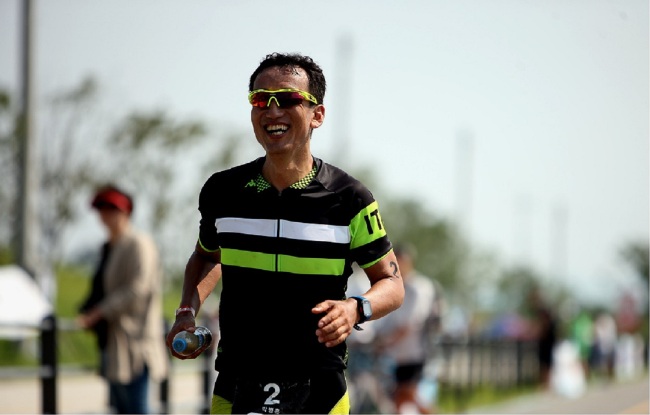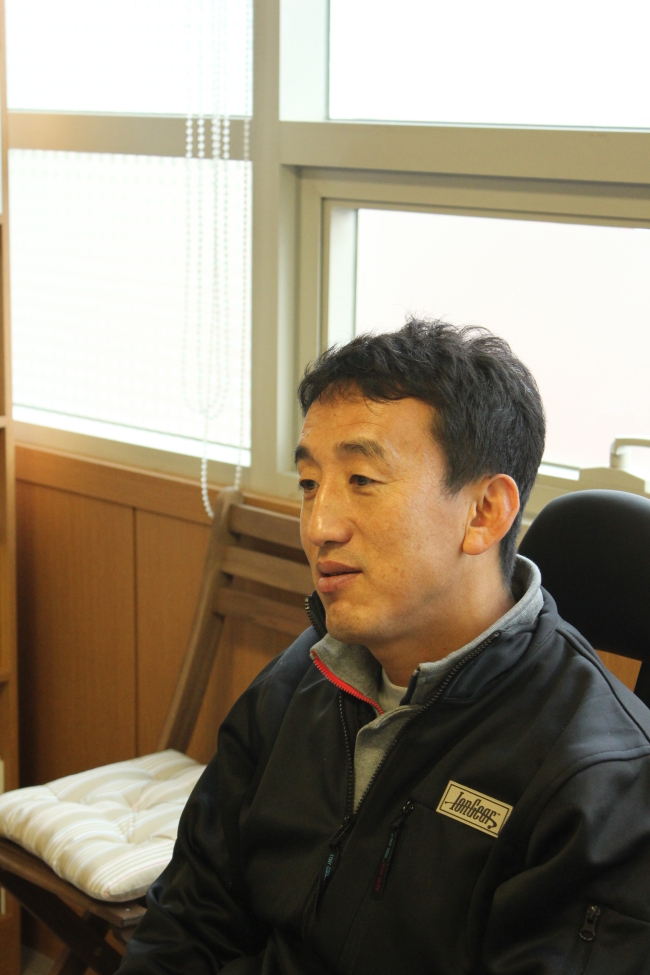This is the first installment in a three-part series featuring athletes who help people transform their lives. – Ed.
Park Byung-hoon doesn’t have a special high-tech suit of armor to keep himself strong and invincible like the Tony Stark character in “Iron Man.”
Park, who is considered a legendary Asian iron man triathlon athlete with some records that still stand, had relied only on his physical and mental strength -- backed by his family’s love -- to cycle, swim and run the Ironman’s high-intensity race courses.
But now at age 45, Park, who finished fifth at the Ironman Japan competition a couple of years ago, seeks to use that strength mainly for three important missions as the chairman of the Ironman Korea Organizing Committee: help athletes get back on their feet postretirement; make Ironman a popular sport that can be enjoyed by everyone, even kids; and hold Ironman Triathlon competitions in Korea.
 |
Park Byung-hoon runs a triathlon race in Yeoju, Korea, in 2015. (Emerson K) |
“It is really difficult for Korean athletes to maintain their livelihoods after retirement because they have only focused on training full-time to win a medal during their youth,” Park said in a recent interview with The Korea Herald.
“There are no absolute answers to how they can live their postretirement lives. But so far, what I have seen is that those who have let go of their past glories and stayed humble have become more successful than when they were athletes.”
Park added that he was once arrogant and full of pride, holding Asia’s Ironman record of 8 hours, 28 minutes and 51 seconds he earned in 2008 in a competition in Florida in the U.S. He also holds numerous other Ironman records and finished at the top of Ironman Japan in 2007.
But when Park looks back on all those years of perspiring while swimming, cycling and running a marathon with very few sponsorships, he wonders what he really gained in life.
“Sure, I gained honor. The triathlon helped me rediscover my life in sports after an injury sustained in college,” Park said.
“But just because you won something or a medal in the past doesn’t mean that your future is secured. You should always try to lower yourself and find newer things to challenge -- that is, I believe, how one can keep on rediscovering and relive your life.”
 |
Park Byung-hoon, chairman of Ironman Korea Organizing Committee (Emerson K) |
Ironman triathlon is definitely not an easy sport, and not one likely to become widely popular among all age groups. Only the prepared can take on the challenge of swimming 1.2 miles, cycling 56 miles and running 13.1 miles for the Ironman 70.3, or the “Half Ironman” race.
Then, there is the tougher Ironman competition where athletes have to swim 3.8 kilometers, cycle 180 kilometers and run 42.2 kilometers.
“It is really tough. Only those who are fully prepared can finish the entire race,” said Park, who used to practice 9 a.m-6 p.m. six days a week, running 200 kilometers, cycling 1,000 kilometers and swimming 36 kilometers on average each week.
More and more people, especially those in their 40s and 50s, are participating in the high-octane sport, seeking to “rediscover their lives,” as Park put it.
“The young rarely participate because they are too busy studying or working, while those in their 40s and 50s, after they have established themselves at work and reached high positions, seek to take on this challenge and gain a healthy lifestyle,” Park said.
“Sports like Ironman can have this kind of positive effect on people’s lives.”
There are “Ironkids” competitions in which parents and their children can swim, cycle and jog together as a team.
Park wants to make this sport accessible for all, and he aims to achieve this by attracting events and races to Korea.
He is currently in talks with Busan to hold an Ironman competition next spring, following up after Ironman Incheon last year.
“This sport can also contribute to tourism as one event can attract more than 3,000 to 4,000 foreigners. And they usually stay for five days. You can’t imagine what that can do for the economy,” Park said.
“I hope a Korean can break my record soon in a competition held in Korea.”
By Park Hyong-ki (
hkp@heraldcorp.com)









